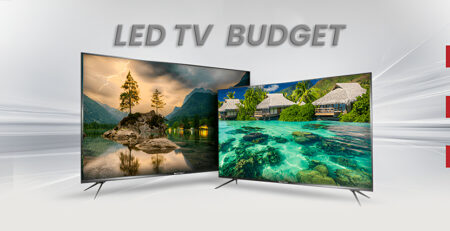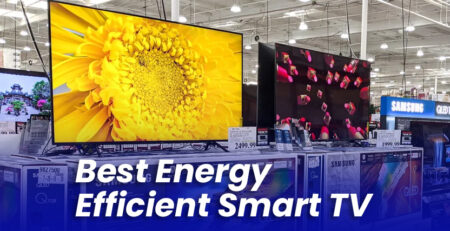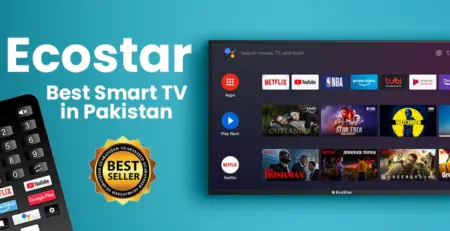Difference between led and lcd tv – Reveal the real champion
The world of entertainment has been revolutionized by the advanced TV innovations. Although smartphones and tablets have changed the way of enjoying content, still the role of TV can’t be denied. Once there was only one type of TV but with time innovation came into the world of television. Now, there is a sea of different types of TVs such as LED, LCD, Google TV, Android TV, OLED, and QLED smart TV. But, the most common and affordable on the list are LCD and LED TVs. Many people get confused when it comes to choosing one because both look similar but there is a difference between LED and LCD TV.
Difference between LED and LCD in electronics

In electronics, the purchase of TV is always at its peak. LED is an advanced technology that uses light-emitting diodes as backlighting. On the other hand, LCD uses fluorescent lamps that brighten the display. When it comes to the difference between LED and LCD in electronics, definitely LEDs are complex and need more to control the light output. Sturdy and durable electronics are always considered user-friendly. However, LEDs are more sensitive to electrical interference than the LCDs. As the LEDs are equipped with more advanced features, they are considered more costly electronics than LCDs.
Difference between LED display and LCD

In electronics stores, while buying TVs, the similarities between the TVs confuse a lot, especially TVs like LCD and LED. But the difference between LED and LCD TV exists. To make the better choice, the TV buying guide can help you to make wise and quicker choices. The LED and LCDs differ based on the following features.
Backlighting
The backlighting system determines the quality of the picture on the TV. LED TVs use light-emitting diodes (LEDs) that allow the display to have better control of the backlighting. Due to this backlighting system, the LED display offers a high-quality picture with perfect blacks and contrast.
On the other hand, LCD uses cold cathode fluorescent lamps (CCFLs) that are not superior to LED. The use of this system makes the LCD heavier than the LED which has a sleek and thinner design.
Curved screen
This is the new technique used by manufacturers to improve the image quality. Mostly value packed smart TVs come with a curved screen that improves the picture quality. Moreover, it reduces the glare and distortion while playing fast-paced content. The curvature of the LED screens assists in focusing the light precisely and directly at the viewer’s eyes. By reducing the reflections, these screens make the image crisper and more immersive.
Contrast ratio
It doesn’t matter how informative and well-captured the visuals are being displayed on your TV, it wouldn’t impress you if your TV failed to show the dark and lights clearer. Perfect control over the backlighting results in better contrast. Contrary to the LCD, LED offers deeper blacks and brighter whites, that provide a more realistic picture.
Color accuracy
The color accuracy determines the quality of the picture. To some extent, both LED and LCD have similar color accuracy. However, some LED TVs are equipped with the latest technologies like quantum dot displays that offer the most vibrant and accurate colors.
Viewing angle
Viewing angles allows you to enjoy the screen content even from any angle. You can’t sit straight, in front of the TV. The best TV has a large view angle that you can view the clear picture from any direction. Both LED and LCD have similar viewing angles. Some LED models use in-plane switching (IPS) panels, which give wider viewing angles than traditional LCD panels that allow a clear view only from the front.
Response time
TV with a fast response rate is always the best because it makes the picture clear without any blur. LED TV has faster response times than LCD. It means that LED TV handles fast-moving images more smoothly and quickly with less blur and shaking.
Energy efficiency
The world is under the effect of extreme escalation. Therefore, people look for devices that are known for their energy efficiency. Therefore, they choose LED TVs because they use less power to produce the same amount of light.
LED TV is more energy wise display than LCD TV because former is certified by the start ratings that make the TV energy efficient as it consumes 25-30% less energy than the LCD or traditional TV.
Resolution
The higher the resolution the clearer the picture is. Nowadays quality TV comes with 4k ultra resolution and other features. Both LED TV and LCD TV are available in a variety of resolutions, such as 4K Ultra HD and 8K Ultra HD. This resolution allows LEDs to show clear and crisp images even on the big screen.
However, LED TV is mostly equipped with the 4k HD feature that makes the images clearer. On the other hand, LCD has no such powerful resolution that lets it produce a low-quality picture than LED.
Refresh rate
The TV that shows more images per second in smoother and flowing motion, is all due to the high refresh rate. LEDs have a high refresh rate of 60 -120 Hz or above. While LCDs have a refresh rate lower than the 60 Hz. That causes blurring during fast-paced motion pictures.
HDR
High Dynamic Range (HDR) ensures a wide range of brightness along with the highest contrast levels, which results in crispy, realistic, and immersive images. LEDs support HDR which makes pictures high quality. Some LCDs also have HDR features but image quality is not as improved as LEDs.
Lifespan
Do the TVs have a lifespan? If so, how long have they been functional properly? The LED has a lifespan of approximately 50,000 hours. While LCD has half LED as it counted around 25,000 hours.
Weight
In the old times, the weight of the TV was so high because of the use of heavy panels. With the advancement in technology, the TVs got thinner and lighter. When the difference between LED and LCD TV is drawn the weight is the prominent feature. LEDs use a thinner panel that adds less weight. On the other hand, the LCDs are comparatively heavy due to the use of heavy panels.
Price
The more advanced product has a high price. LEDs cost high due to the use of the latest technology and energy-efficient design. Based on the size, brand, and model the price of LED varies. LCD is not equipped with the latest display and audio technologies that make it less costly. Before choosing a TV, know your preference and the budget as well.
If you are a beginner in buying a TV and are confused about the selection, go through the comparative features that will make your precious selection easier.
led tv vs lcd tv which is best
 Undoubtedly, everyone wants the best TV to experience the immersive view at home along with the family. Therefore, all look for the best product that has a quality display, energy-efficient design, and an affordable budget. When it comes to choosing between LED and LCD there is always confusion but the comprehensive difference between LED TV and LCD TV makes the choice easier. Due to advanced display type, high resolution and contrast ratios, fast refresh rate, and less energy-consuming design, undoubtedly LED is the best.
Undoubtedly, everyone wants the best TV to experience the immersive view at home along with the family. Therefore, all look for the best product that has a quality display, energy-efficient design, and an affordable budget. When it comes to choosing between LED and LCD there is always confusion but the comprehensive difference between LED TV and LCD TV makes the choice easier. Due to advanced display type, high resolution and contrast ratios, fast refresh rate, and less energy-consuming design, undoubtedly LED is the best.
Are LCD monitors good?

For people who don’t want to break the bank, undoubtedly, LCD monitors are good for them. How is an LCD screen different from other monitors, this is what people want to know before investing in the screens. Contrary to CRT monitors, LCD monitors have quality pictures and resolutions. In addition, the LCD screen is more energy efficient than the other monitors.
Another feature that makes the LCD monitors a good choice over the other monitors is the thin and slim design. The thin design allows quick and easy transport as well as mounting on the wall.
Affordability is another factor that compels people to purchase LCD screens. The other monitors like LED, OLED, or QLED cost high. So, make the right choice by keeping your budget in view.
led vs lcd tv power consumption

In the present time, the graph of inflation is rising so the electricity bills are adding up to the monthly budget. Therefore, the public looks for energy-efficient electronics. From the list, TV is one of the top rankings that is used more. Therefore, the TV is making headlines due to its energy-efficient design. These TVs consume less energy than LCDs because they are certified by the Energy Star Ratings ensuring that LED TV consumes 25-30% less than LCDs. Less power consumption makes the LED smart TV the best. LCDs consume more energy as well as get heated up on some extra use.
led vs lcd tv which is better for the eyes
 High digital strain severely affects the eyes. Therefore, experts recommend monitors that lessen eye strain. LED tv due to better contrast offers easy readability. In addition, LED TV offers multiple dimming options as well as other screen-comforting virtual tweaks that improve the visual quality. It doesn’t matter how long you sit in front of the screen; your eyes will never be compromised.
High digital strain severely affects the eyes. Therefore, experts recommend monitors that lessen eye strain. LED tv due to better contrast offers easy readability. In addition, LED TV offers multiple dimming options as well as other screen-comforting virtual tweaks that improve the visual quality. It doesn’t matter how long you sit in front of the screen; your eyes will never be compromised.
Besides all, be careful about having too much screen time as it affects the body’s health! Keep in mind moderation is the key!
led vs led tv for gaming

If you are a gamer, you might have an idea of what gaming needs. The key difference between LED and LCD TV is the refresh and response time. In addition, low input lag decides the speed of the game and response to the actions. LED TV has superior image quality, fast response time, and the highest refresh rate which makes it ideal for gaming. Due to better color contrast, large viewing angles, and easy tracking, it is the best option for the players.
Conclusion
The comprehensive difference between LED and LCD TV allows you to choose the best TV for your home. Both TVs come with unique features that make them different from each other. Based on the screen size and curvature, resolution, contrast ratio, refresh rate, response time, and HDR the LED TV lies in the first place. When it comes to affordability LCD monitors have lower prices than LED TVs. Due to the use of the latest technology and Smart panels, LED has a thinner and lighter design that makes its portability and mounting easier.
In addition, the LEDs have a fast processor and graphics that make them an ideal choice for gamers. Not only this, LED TV has better backlighting control over the contrast which makes it suitable for reducing eye strain. If you are looking for an appealing and energy-efficient design display for your home or workplace, choose the one that fits your preference and budget needs.














LEAVE A COMMENT